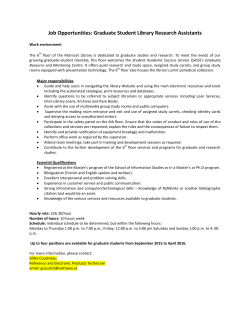
Ph.D. - Department of Integrated Systems Engineering
Industrial and Systems Engineering Doctor of Philosophy Degree Program in Manufacturing Process Engineering Department of Integrated Systems Engineering The Ohio State University Ph.D. Admission Requirements. In general, preference is given to applicants who are graduates of accredited colleges and universities in the U.S. with a Bachelor of Science degree from an ABET accredited Engineering program, and with a CGPA of 3.2/4.0 or greater. Applicants who are engineering graduates of non-‐U.S. institutions and are clearly outstanding may be accepted as resources and as faculty workloads permit. GRE test is required of all applicants. TOEFL test is required for any international students from countries on the OSU Admissions Office list (typically where the primary language is not English), unless a bachelor’s degree was earned in an English speaking country. (International students who want to be considered for a Graduate Teaching Associate position do, however, need to take the TOEFL to be considered.) These requirements also apply to all students who apply to transfer from another graduate program at OSU to ISE. New international graduate students for whom English is not the first language must certify their proficiency in spoken English before assuming Graduate Teaching Associate (GTA) duties. They may become certified by scoring 28 or higher on the spoken portion of the TOEFEL iBT or by scoring at the appropriate level on the Oral Proficiency Assessment (OPA) administered by the ESL Spoken English Program. Ph.D. Graduate Program Description. Faculty members in ISE work with graduate students in small groups, or on an individual basis, toward advancing technology in the following specific areas: • Polymer composites and nanocomposites manufacturing • Forming of lightweight materials • Light metal alloy development • Light metal casting processes • Micromachining and precision engineering Ph.D. Program Requirements. For the ISE Ph.D. Program in Manufacturing Process Engineering, students must complete a minimum of 80 semester credit hours of graduate level courses beyond the baccalaureate degree. A block of 30 semester credit hours will be granted for an appropriate earned Master’s degree. Students entering the Ph.D. program directly from the BS degree typically (although not necessarily) fulfill the requirements for, and acquire, an ISE MS degree while engaged in accumulating the 30 hours of course work to complete the Ph.D. course requirements. A minimum of 30 semester credit hours of graduate level courses beyond the Master’s degree is required. The Doctoral Candidacy Examination is normally administered at the completion of the Ph.D. course work and prior to the beginning of formal dissertation work. At least one semester prior to graduation, a public presentation of the dissertation research proposal and work completed to-‐ date is required (ISE Dissertation Proposal Colloquium). Successful defense of the dissertation research (Final Oral Examination) and submission of the completed dissertation document complete the Ph.D. program. Ph.D. Course Requirements. The ISE Ph.D. course work requirement in Manufacturing Process Engineering consists of a minimum 15 credit hours in a Primary concentration topic area (for example, Polymer Composites), two Secondary areas of concentration (minimum 6 credit hours each), and Graduate Research Seminar (minimum 3 credit hours). In addition, 2 semester credit hours of ISE the Graduate Research Seminar are required (ISE 7883 Graduate seminar -‐ 1 credit hour per semester). There are no specific required courses for the Ph.D. program in Manufacturing Process Engineering; each student selects their Primary and Secondary areas of concentration, and the specific courses within those concentrations, in close counsel with the ISE faculty member with whom they are working. The course work to fulfill the Primary and Secondary areas of concentration is intended to be carefully selected (customized) to educate the student in the fundamentals necessary to support their dissertation research. If regular graduate level courses are not available in the topics desired, graduate level individual studies courses guided by the student’s faculty advisor, and graduate level group studies courses are acceptable alternatives. To earn the remaining 20 hours (minimum) of graduate credit hours to complete the Ph.D. degree requirements (30 for MS + 30 ISE Ph.D. courses + 20 remaining = 80 total), students may enroll for any combination of graduate research credit hours, or additional graduate level course work hours. Specific courses regularly taught as part of the M.S./Ph.D. program include: • Manufacturing Engineering Courses o ISE 5463 Manufacturing of Energy Systems (3 credit hours): Design, manufacture and integration of conventional and renewable energy systems including their environmental impact. o ISE 5501 Fundamentals of Solid State Processing (3 credit hours): Principles of elastic/plastic deformation of metallic solids, application of heat transfer, mechanical behavior of metals, and tribology to bulk forming processes (forging, extrusion, rolling, wire and bar drawing), sheet metal forming and shearing, and machining of metals by chip-‐forming processes. o ISE 5502 Fundamentals of Liquid Shaping Processes /MATSCEN 5451 Process Metallurgy (cross-‐listed course, 3 credit hours): Principles of liquid metal processing, application of thermodynamics, kinetics, and macro-‐transport phenomena to primary metals production, refining, and solidification of metal casting alloys. o ISE 5530 Fundamentals of Tool Engineering (3 credit hours): Form, function, mechanical elements, common materials, thermal considerations and economic analysis in the design of work-‐holding fixtures and jigs, dies/molds, and cutting tools. o ISE 5540 Polymer Processing Fundamentals (3 credit hours): Application of fundamentals of transport phenomena and polymer constitutive equations to the analysis of plastic component manufacture. o ISE 5550 Principles of Precision Engineering (3 credit hours): Principles of precision engineering with focus on design and performance of precision machinery, machine tool metrology and precision manufacturing processes. o ISE 5555 Manufacturing Processes and Machine Tools (3 credit hours): Analysis of machining processes: cutting, grinding and milling, including descriptive and analytical treatments of machining processes, equipment, and computer control. o MATSCEN 5441 Physical Metallurgy (3 credit hours): Physical metallurgy of ferrous and non-‐ferrous alloys, with emphasis on alloy design, processing and structure-‐property relations. • • o MECHENG 5680 Computer Aided Design and Manufacturing (4 credit hours): Design of machine components, surfaces, and assemblies using parametric and feature-‐based design principles and advanced design tools. o MECHENG 5682 Fundamentals of Product Design Engineering (4 credit hours): Fundamentals of the product design process, from concept creation to final implementation, including product architecture and design for manufacture and assembly. Courses Focused on Mathematical, Statistical, or Numerical Methodologies o ISE 5110 Design of Engineering Experiments (3 credit hours): Plan and analyze experiments relevant to system design. Also, students will learn regression and alternative approaches for on-‐hand data analysis. o ISE 5503 Manufacturing Processes and Simulation (3 credit hours): Principles of simulation by numerical methods for manufacturing processes such as casting, machining, sheet forming, and injection molding. o MECHENG 5139 Applied Finite Element Method (3 credit hours): Overview of finite element method, description of finite element software, modeling requirements and techniques, analysis using general purpose software, and case studies. Courses for Breadth in ISE o ISE 5200 Linear Optimization (3 credit hours): Introduction to the linear optimization and applications. Topics include model formulation, solution methods, polyhedral and duality theory, sensitivity analysis, and software usage. o ISE 5100 Performance Modeling and Simulation (3 credit hours): System modeling using stochastic models and discrete event simulation; system design and decision-‐making using analysis and simulation tools. o ISE 5700 Cognitive Systems Engineering (3 credit hours): Human-‐centered design of consumer products, web sites and complex sociotechnical systems. Topics include human-‐computer interaction and the design of decision support and distributed work systems. ISE 6300 Simulation for System Analytics and Decision-‐Making (3 credit hours): Students learn how to collect data and perform input analysis, model systems using discrete-‐event simulation, and inform system design decision-‐making through defensible output analysis. o
© Copyright 2025









